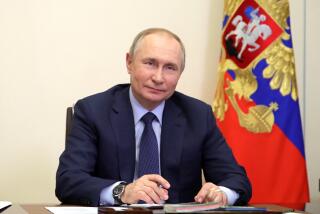PERSPECTIVE ON THE SOVIET UNION : Yeltsin’s Inner Circle Is His Reality Check : His commitment can be seen in his choice of an adviser on the key, volatile ethnic issue--remarkably, a woman.
- Share via
MOSCOW — The Bush Administration wasted no time in offering a less than flattering appraisal of Boris Yeltsin’s post-coup performance. Within 10 days of the failed putsch, National Security Adviser Brent Scowcroft used the opportunity of an interview to reassert his doubts about Yeltsin’s commitment to democracy. These uncalled-for remarks were a boost to democracy’s political enemies, who are now desperately looking for ways to make Yeltsin vulnerable after his dramatic blow against the coup conspirators and their supporters. When times get hard in the challenging months ahead, Scowcroft’s words could be used by enemies of progressive change to drive a wedge between Yeltsin and democratic forces, including those in the West.
It is a mystery to me why the Administration thinks it knows more about the character of the Soviet Union’s leaders than the people who live and work in Soviet society. Apparently it has made no impression on Gen. Scowcroft--or President Bush--that virtually all of Mikhail Gorbachev’s progressive advisers and aides left him for the Yeltsin camp long before the coup.
Even more so now, Yeltsin is praised by these advisers for being decisive and intellectually receptive. “He has grown tremendously,” Gen. Dmitri Volkaganov, Yeltsin’s chief military adviser, told me. “He does not pretend to know everything. He is anxious to learn and he is a good listener.”
This is generally acknowledged in Moscow as a miraculous trait, especially since Gorbachev’s team either quit or eventually conspired against him.
Of the many advisers who confirm this Yeltsin quality, none has been more impressive than Galina Starovoitova, the Russian president’s personal adviser for interethnic issues. Because of secessionist movements in the Soviet Union, and within Russia itself, this is perhaps the most difficult and delicate post in the government. Yeltsin’s choice of Starovoitova to fill this critical position is most revealing.
Starovoitova combines many of the qualities that her boss is said to lack. She is tactful, sensitive and deeply knowledgeable in her field. An ethnographer and “ethnopsychologist” by background, she has managed to convey respect and demonstrate understanding in some of the country’s hottest spots. In 1989, for instance, Starovoitova was elected to the Congress of People’s Deputies to represent Armenia, an ardently anti-empire republic. Despite the fact that she is Russian, she won the hearts of Armenians everywhere for her support for the Karabakh Committee and for the aspirations of the Armenian majority in Nagorno-Karabakh.
Since assuming her role with Yeltsin earlier this year, Starovoitova’s cross-cultural knowledge and her tact and diplomacy have been tested daily. Last week, for instance, she was asked to intervene in an armed confrontation in the Northern Caucasus. Militants threatened to remove the president of Chechen-Ingush, a coup sympathizer, from his post as chief executive of the tiny autonomous republic. Both sides were equally armed and demonstrators had taken to the streets. Through nonstop telephone counseling and an appeal that she wrote in the Checheno language, Starovoitova managed to persuade both sides to adopt the constitutional approach and convene a session of parliament to consider the matter. The president’s removal was then accomplished democratically, without bloodshed.
“Gorbachev,” she said, “always gave the impression that there was not a serious base to the nationalist movements. He implied that nationalists were just armed hooligans. But these are ancient nations with their own value systems and cultures. . . . We have to find legal mechanisms that will take into account their historic and cultural imperatives, as well as the human right of self-determination. . . . Keeping the status quo (will not necessarily foster) stability.”
Starovoitova, a close friend and associate of Andrei Sakharov, has become a powerful popular leader in a country that has never genuinely promoted women. Her coolheaded deftness has made her not only the most influential woman on the Soviet and Russian scene today, but also one of the most sought-after people surrounding Yeltsin.
Any future assessment of Yeltsin’s ultimate goals must take into consideration who advises him and implements his policies. So far, Yeltsin has attracted and maintained the loyalty of a group of progressive democrats and market reformers. It will be their future or lack of it in the Yeltsin administration that will tell us more about the Russian president’s true intentions than all of his public or semipublic posturing.
More to Read
Sign up for Essential California
The most important California stories and recommendations in your inbox every morning.
You may occasionally receive promotional content from the Los Angeles Times.











